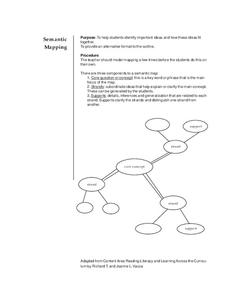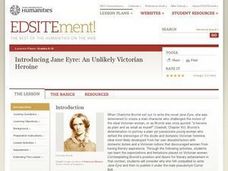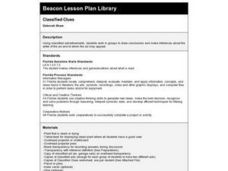Curated OER
Stereotypes
Students analyze then sort a given list of words by selected categories about stereotypes. They complete a list of activities then write their opinion about national stereotypes to present to the class.
Curated OER
Using Random Sampling to Draw Inferences
Emerging statisticians develop the ability to make inferences from sample data while also working on proportional relationships in general. Here, young learners examine samples for bias, and then use random samples to make inferences...
Curated OER
Call It a Hunch
Give young scholars a chance to practice making inferences after reading the book Through My Eyes by Ruby Bridges. They confirm whether or not their conclusions are true, have a class discussion, and then independently complete an...
Curated OER
Making Inferences While Identifying Similes and Metaphors
Use this lesson to study similes and metaphors and the inferred meaning. In this language arts lesson, 5th graders write their own similes and metaphors. A worksheet is provided for extension work or to check understanding as homework.
Teaching Tolerance
Using Photographs to Teach Social Justice | Affirming Our Commonalities and Differences
Photos can challenge stereotypes. To gain an understanding of the big picture, groups examine a series of photographs and analyze how a photographer's choices can shape a viewer's reaction to an image. For the first set of photographs,...
Curated OER
The True Confessions of Charlotte Doyle: Graphic Organizer
After completing the first five chapters of The True Confessions of Charlotte Doyle By Avi, use direct quotes to make inferences about how Charlotte feels about certain characters. Later, when the novel has concluded, revisit the text to...
National Endowment for the Humanities
Harriet Jacobs and Elizabeth Keckly: The Material and Emotional Realities of Childhood in Slavery
Young historians learn how to make generalizations based on primary sources in a lesson that uses the autobiographies of two women born into slavery. The class watches a historical re-enactment of scenes from the lives of Harriet Jacobs...
Curated OER
Get the Joke!
Middle schoolers explore humor through word context and inference used in everyday language.
Curated OER
Philanthropic Literature: Quilt to Freedom
A reading of Sweet Clara and the Freedom Quilt by Deborah Hopkinson launches this study of slavery, freedom, and the Underground Railroad. After a discussion of the importance of showing respect for others and of helping each other in...
University of Georgia
Energy Content of Foods
Why do athletes load up on carbohydrates the evening before a competition? The lesson plan helps answer this question as it relates the type of food to the amount of energy it contains. After a discussion, scholars perform an experiment...
Curated OER
First Nations in the Media
Students analyze the portrayal of Aboriginal people in the media. In this stereotype identification lesson, students investigate the ways the media represents Aboriginal culture. Students use the Internet to research, and present their...
Curated OER
Semantic Mapping
Students explore semantic mapping. Through teacher modeling and independent practice they complete a variety of semantic (concept) maps to coincide with specific areas of subject matter. They identify the core concept and include...
Houghton Mifflin Harcourt
Practice Book: The Boy Who Saved Baseball
An array of reading comprehension, grammar, spelling, and vocabulary activities are at your fingertips with a language arts practice packet. Second, third, and fourth graders work on various skills using reading passages and word banks,...
Museum of Tolerance
Developing Media Literacy
To protect young people from questionable content, many schools limit access. This resource suggests that because learners can so readily avail themselves to unrestricted Internet access, it is vital for 21st century learners to develop...
Curated OER
Introducing Jane Eyre: An Unlikely Victorian Heroine
High schoolers investigate the expectations and limitations placed on Victorian women and evaluate Charlotte Bronte's position and desire for literary achievement in using the male pseudonym, Currer Bell.
Curated OER
The Family: Louisiana Family Folklore
Students explore and identify family treasures and research the history to each one. They also organize a variety of artifacts into various categories and research traditional Louisiana artifacts online. Each student draws inferences...
Curated OER
What's the Best Deal?
Young scholars explore number sense by solving consumer math problems. In this pattern identification lesson, students analyze a list of numerical and geometric patterns while predicting the future outcome. Young scholars utilize...
Teaching Tolerance
Using Photographs to Teach Social Justice | Supporting Social Border Crossings
A lunch-time activity encourages pupils to step out of their usual lunch bunch and connect with someone new. To begin, individuals examine a group photograph and identify what they believe is the gender, race, religion, and sexual...
Curated OER
Classified Cues
Learners analyze classified advertisements to make inferences about who wrote the ad and who may find the ad appealing. They write their own classified ads based on what they have learned.
Curated OER
Location, Location, Location: Using a Grid to Determine Context
Seventh graders are introduced to making inferences about artifacts. Using a grid system, they locate the artifacts and determine where they originated from. They use this information to make conclusions about the way people lived...
Curated OER
Rockin’ the World: Rock and Roll and Social Protest in 20th Century America
Students explore protest songs. In this interdisciplinary lesson, students examine issues-based music by summarizing lyrics and revealing inferences, generalizations, conclusions, and points of view found in the songs.
Curated OER
Finding Buck Henry
Students read and demonstrate competence in the general skills and strategies of the writing process via the novel "Finding Buck Henry." They recognize complex elements of plot. Students analyze devices used to develop characters in...
Curated OER
What Happens on Average
Fifth graders are introduced to convergence of sequences based on averaging previous terms in the sequence. The power of the "fill-down" function in spreadsheets is exploited. By using various starting numbers, and inferring the limit,...
Curated OER
Fish Communities in the Hudson
Learning to read data tables is an important skill. Use this resource for your third, fourth, or fifth graders. Learners will will study tables of fish collection data to draw conclusions. The data is based on fish environments in the...

























